Essay: Human Rights Act's Impact on UK Constitutional Order (CAHR)
VerifiedAdded on 2020/01/28
|9
|3028
|111
Essay
AI Summary
This essay delves into the complexities of parliamentary sovereignty within the UK constitution, examining its historical context and evolution. It explores the traditional views of A.V. Dicey and subsequent reinterpretations by legal scholars in light of developments such as the European Communities Act 1972 and the Human Rights Act 1998. The essay analyzes how these developments, including the devolution of power, the establishment of the Supreme Court, and the UK's membership in the European Union, have challenged or modified the principle of parliamentary sovereignty. It discusses key constitutional principles, the nature of the UK's unwritten constitution, and the impact of the Human Rights Act (HRA) on the balance of power. The essay evaluates the extent to which the HRA has altered the constitutional order, considering the interplay between parliamentary supremacy, judicial review, and the protection of fundamental rights. It also touches upon the limitations of parliamentary power and the role of political and institutional factors in shaping constitutional practice.
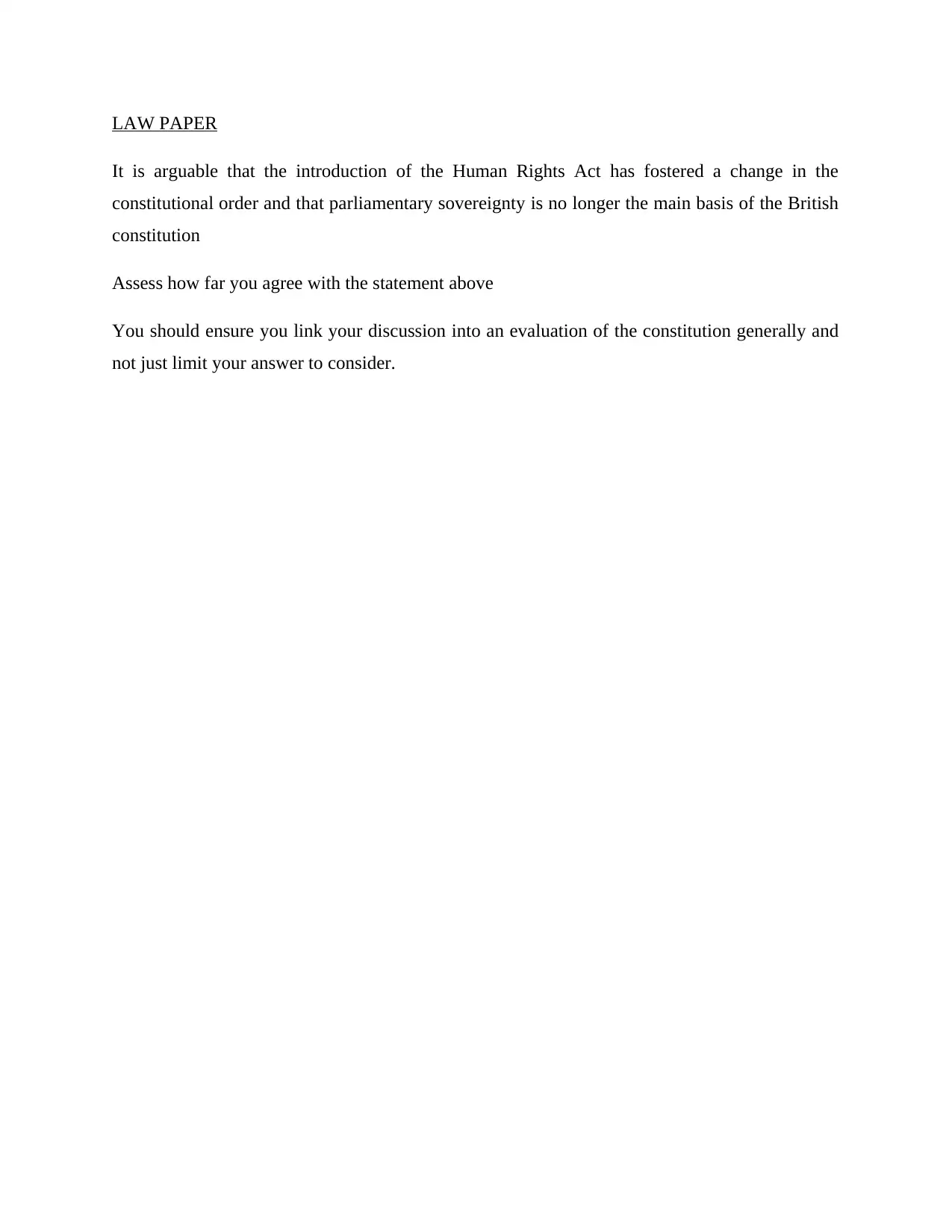
LAW PAPER
It is arguable that the introduction of the Human Rights Act has fostered a change in the
constitutional order and that parliamentary sovereignty is no longer the main basis of the British
constitution
Assess how far you agree with the statement above
You should ensure you link your discussion into an evaluation of the constitution generally and
not just limit your answer to consider.
It is arguable that the introduction of the Human Rights Act has fostered a change in the
constitutional order and that parliamentary sovereignty is no longer the main basis of the British
constitution
Assess how far you agree with the statement above
You should ensure you link your discussion into an evaluation of the constitution generally and
not just limit your answer to consider.
Paraphrase This Document
Need a fresh take? Get an instant paraphrase of this document with our AI Paraphraser
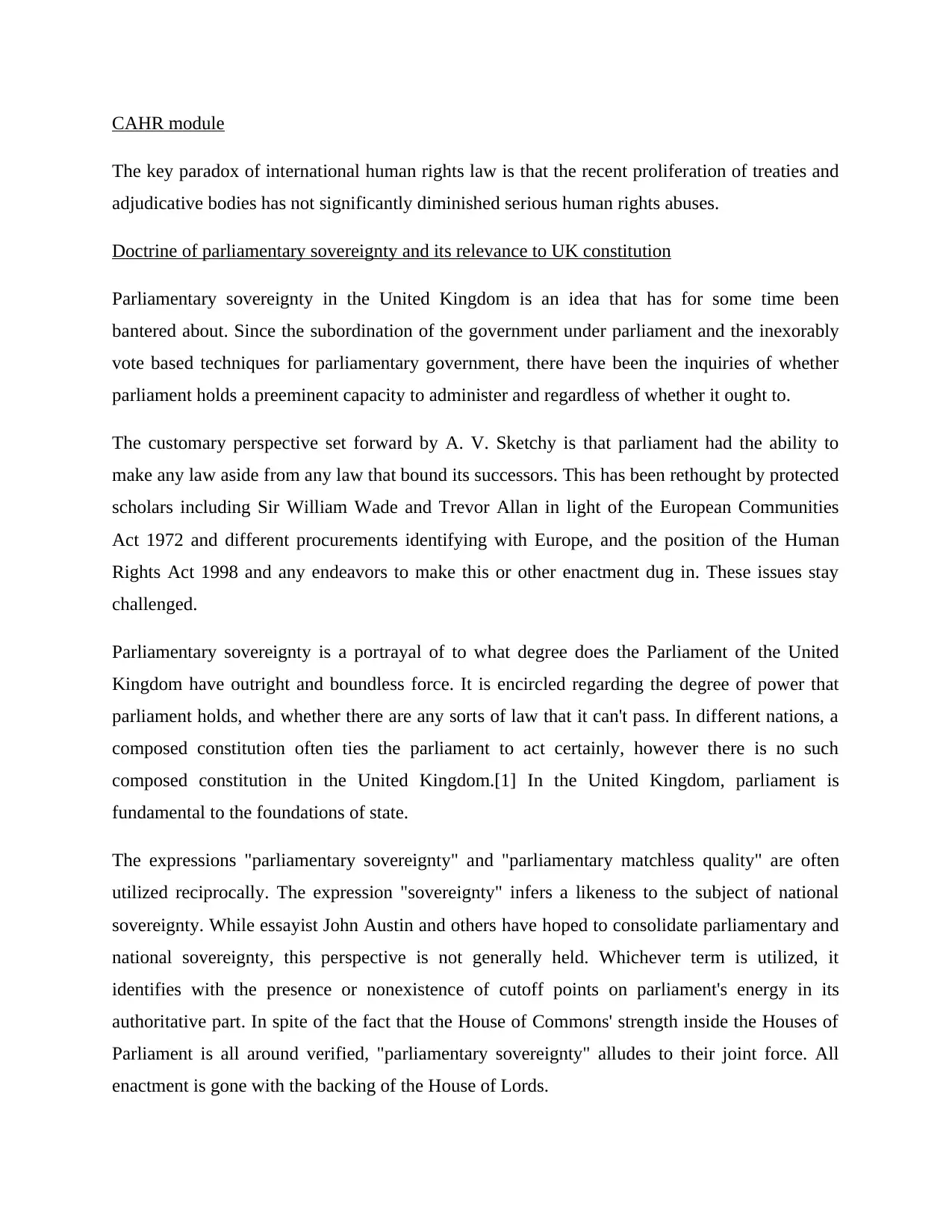
CAHR module
The key paradox of international human rights law is that the recent proliferation of treaties and
adjudicative bodies has not significantly diminished serious human rights abuses.
Doctrine of parliamentary sovereignty and its relevance to UK constitution
Parliamentary sovereignty in the United Kingdom is an idea that has for some time been
bantered about. Since the subordination of the government under parliament and the inexorably
vote based techniques for parliamentary government, there have been the inquiries of whether
parliament holds a preeminent capacity to administer and regardless of whether it ought to.
The customary perspective set forward by A. V. Sketchy is that parliament had the ability to
make any law aside from any law that bound its successors. This has been rethought by protected
scholars including Sir William Wade and Trevor Allan in light of the European Communities
Act 1972 and different procurements identifying with Europe, and the position of the Human
Rights Act 1998 and any endeavors to make this or other enactment dug in. These issues stay
challenged.
Parliamentary sovereignty is a portrayal of to what degree does the Parliament of the United
Kingdom have outright and boundless force. It is encircled regarding the degree of power that
parliament holds, and whether there are any sorts of law that it can't pass. In different nations, a
composed constitution often ties the parliament to act certainly, however there is no such
composed constitution in the United Kingdom.[1] In the United Kingdom, parliament is
fundamental to the foundations of state.
The expressions "parliamentary sovereignty" and "parliamentary matchless quality" are often
utilized reciprocally. The expression "sovereignty" infers a likeness to the subject of national
sovereignty. While essayist John Austin and others have hoped to consolidate parliamentary and
national sovereignty, this perspective is not generally held. Whichever term is utilized, it
identifies with the presence or nonexistence of cutoff points on parliament's energy in its
authoritative part. In spite of the fact that the House of Commons' strength inside the Houses of
Parliament is all around verified, "parliamentary sovereignty" alludes to their joint force. All
enactment is gone with the backing of the House of Lords.
The key paradox of international human rights law is that the recent proliferation of treaties and
adjudicative bodies has not significantly diminished serious human rights abuses.
Doctrine of parliamentary sovereignty and its relevance to UK constitution
Parliamentary sovereignty in the United Kingdom is an idea that has for some time been
bantered about. Since the subordination of the government under parliament and the inexorably
vote based techniques for parliamentary government, there have been the inquiries of whether
parliament holds a preeminent capacity to administer and regardless of whether it ought to.
The customary perspective set forward by A. V. Sketchy is that parliament had the ability to
make any law aside from any law that bound its successors. This has been rethought by protected
scholars including Sir William Wade and Trevor Allan in light of the European Communities
Act 1972 and different procurements identifying with Europe, and the position of the Human
Rights Act 1998 and any endeavors to make this or other enactment dug in. These issues stay
challenged.
Parliamentary sovereignty is a portrayal of to what degree does the Parliament of the United
Kingdom have outright and boundless force. It is encircled regarding the degree of power that
parliament holds, and whether there are any sorts of law that it can't pass. In different nations, a
composed constitution often ties the parliament to act certainly, however there is no such
composed constitution in the United Kingdom.[1] In the United Kingdom, parliament is
fundamental to the foundations of state.
The expressions "parliamentary sovereignty" and "parliamentary matchless quality" are often
utilized reciprocally. The expression "sovereignty" infers a likeness to the subject of national
sovereignty. While essayist John Austin and others have hoped to consolidate parliamentary and
national sovereignty, this perspective is not generally held. Whichever term is utilized, it
identifies with the presence or nonexistence of cutoff points on parliament's energy in its
authoritative part. In spite of the fact that the House of Commons' strength inside the Houses of
Parliament is all around verified, "parliamentary sovereignty" alludes to their joint force. All
enactment is gone with the backing of the House of Lords.
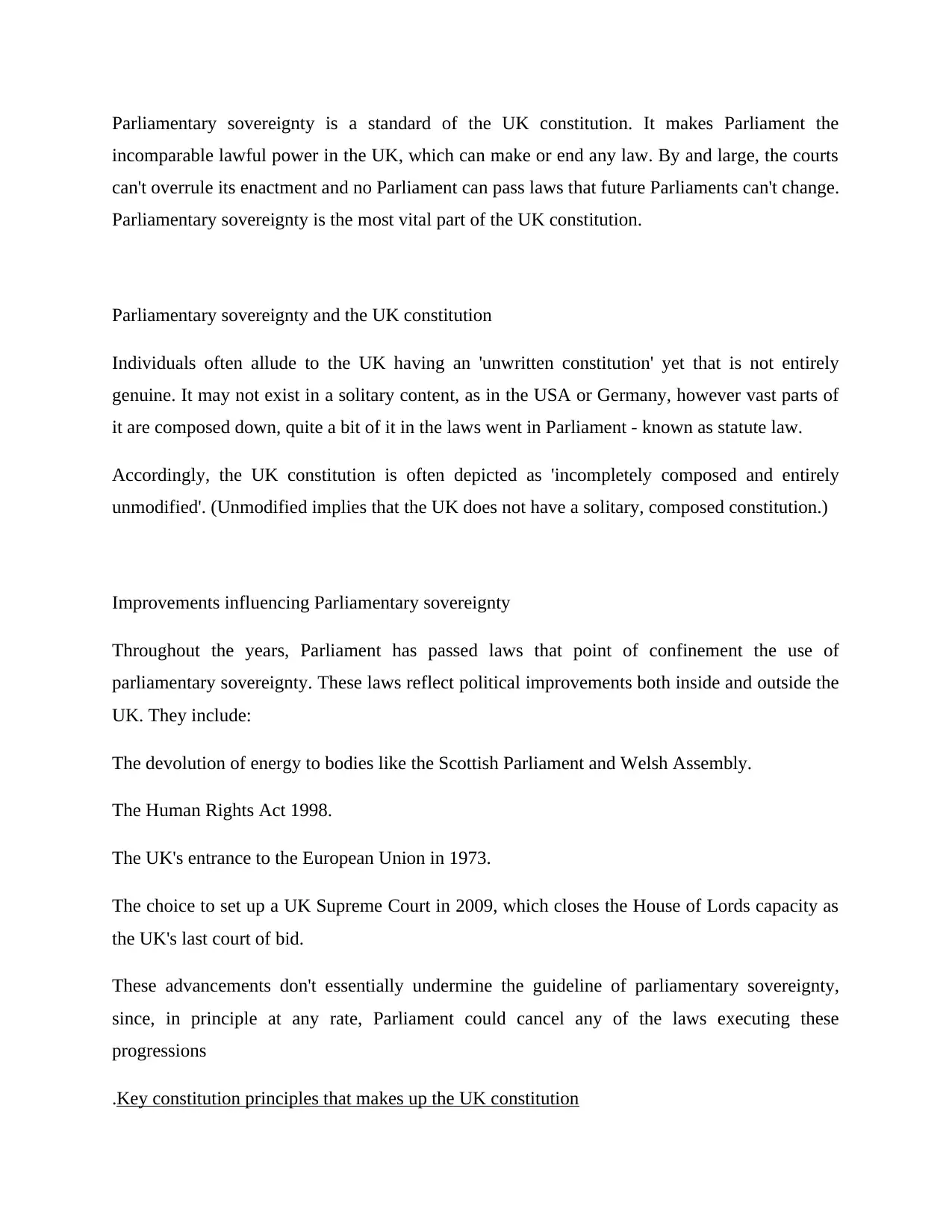
Parliamentary sovereignty is a standard of the UK constitution. It makes Parliament the
incomparable lawful power in the UK, which can make or end any law. By and large, the courts
can't overrule its enactment and no Parliament can pass laws that future Parliaments can't change.
Parliamentary sovereignty is the most vital part of the UK constitution.
Parliamentary sovereignty and the UK constitution
Individuals often allude to the UK having an 'unwritten constitution' yet that is not entirely
genuine. It may not exist in a solitary content, as in the USA or Germany, however vast parts of
it are composed down, quite a bit of it in the laws went in Parliament - known as statute law.
Accordingly, the UK constitution is often depicted as 'incompletely composed and entirely
unmodified'. (Unmodified implies that the UK does not have a solitary, composed constitution.)
Improvements influencing Parliamentary sovereignty
Throughout the years, Parliament has passed laws that point of confinement the use of
parliamentary sovereignty. These laws reflect political improvements both inside and outside the
UK. They include:
The devolution of energy to bodies like the Scottish Parliament and Welsh Assembly.
The Human Rights Act 1998.
The UK's entrance to the European Union in 1973.
The choice to set up a UK Supreme Court in 2009, which closes the House of Lords capacity as
the UK's last court of bid.
These advancements don't essentially undermine the guideline of parliamentary sovereignty,
since, in principle at any rate, Parliament could cancel any of the laws executing these
progressions
.Key constitution principles that makes up the UK constitution
incomparable lawful power in the UK, which can make or end any law. By and large, the courts
can't overrule its enactment and no Parliament can pass laws that future Parliaments can't change.
Parliamentary sovereignty is the most vital part of the UK constitution.
Parliamentary sovereignty and the UK constitution
Individuals often allude to the UK having an 'unwritten constitution' yet that is not entirely
genuine. It may not exist in a solitary content, as in the USA or Germany, however vast parts of
it are composed down, quite a bit of it in the laws went in Parliament - known as statute law.
Accordingly, the UK constitution is often depicted as 'incompletely composed and entirely
unmodified'. (Unmodified implies that the UK does not have a solitary, composed constitution.)
Improvements influencing Parliamentary sovereignty
Throughout the years, Parliament has passed laws that point of confinement the use of
parliamentary sovereignty. These laws reflect political improvements both inside and outside the
UK. They include:
The devolution of energy to bodies like the Scottish Parliament and Welsh Assembly.
The Human Rights Act 1998.
The UK's entrance to the European Union in 1973.
The choice to set up a UK Supreme Court in 2009, which closes the House of Lords capacity as
the UK's last court of bid.
These advancements don't essentially undermine the guideline of parliamentary sovereignty,
since, in principle at any rate, Parliament could cancel any of the laws executing these
progressions
.Key constitution principles that makes up the UK constitution
⊘ This is a preview!⊘
Do you want full access?
Subscribe today to unlock all pages.

Trusted by 1+ million students worldwide
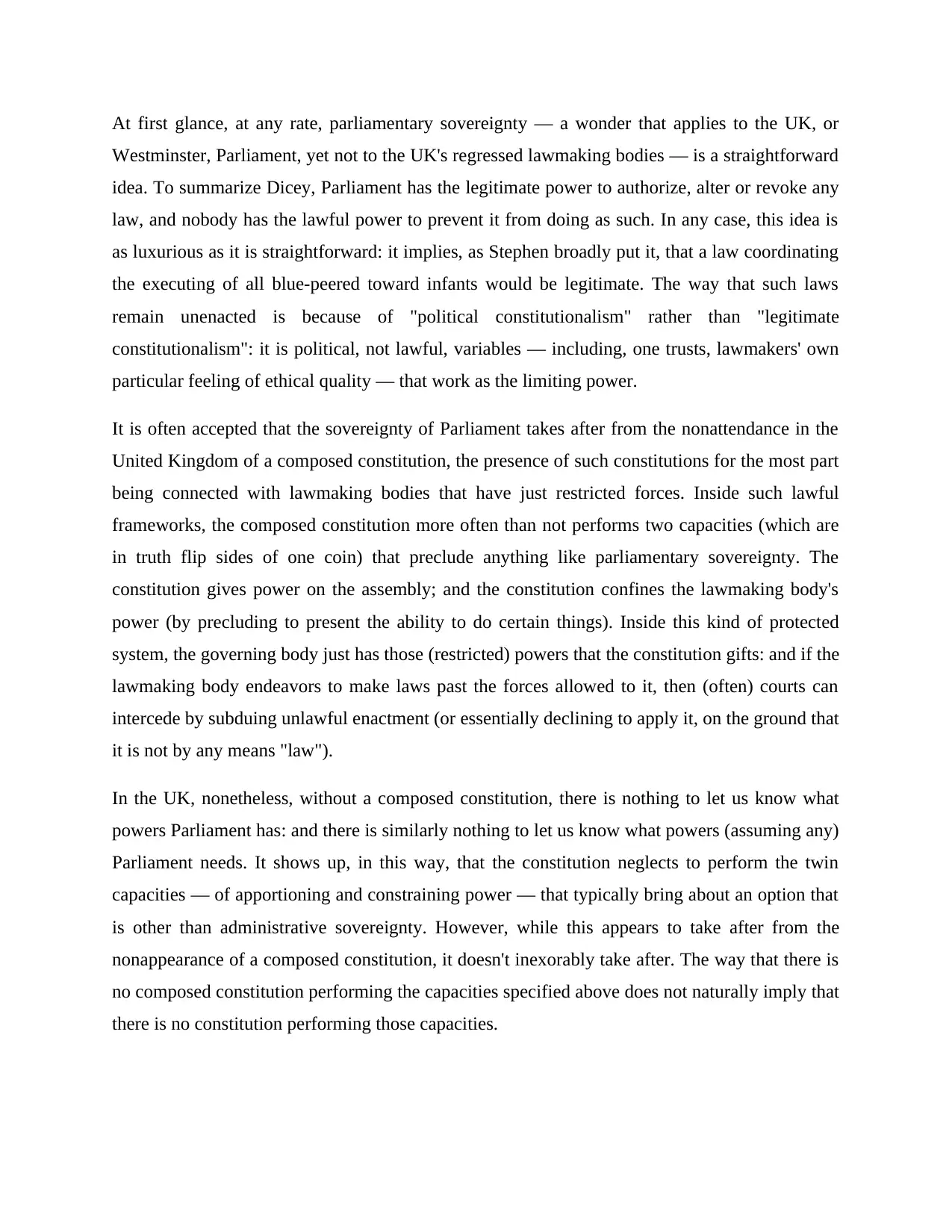
At first glance, at any rate, parliamentary sovereignty — a wonder that applies to the UK, or
Westminster, Parliament, yet not to the UK's regressed lawmaking bodies — is a straightforward
idea. To summarize Dicey, Parliament has the legitimate power to authorize, alter or revoke any
law, and nobody has the lawful power to prevent it from doing as such. In any case, this idea is
as luxurious as it is straightforward: it implies, as Stephen broadly put it, that a law coordinating
the executing of all blue-peered toward infants would be legitimate. The way that such laws
remain unenacted is because of "political constitutionalism" rather than "legitimate
constitutionalism": it is political, not lawful, variables — including, one trusts, lawmakers' own
particular feeling of ethical quality — that work as the limiting power.
It is often accepted that the sovereignty of Parliament takes after from the nonattendance in the
United Kingdom of a composed constitution, the presence of such constitutions for the most part
being connected with lawmaking bodies that have just restricted forces. Inside such lawful
frameworks, the composed constitution more often than not performs two capacities (which are
in truth flip sides of one coin) that preclude anything like parliamentary sovereignty. The
constitution gives power on the assembly; and the constitution confines the lawmaking body's
power (by precluding to present the ability to do certain things). Inside this kind of protected
system, the governing body just has those (restricted) powers that the constitution gifts: and if the
lawmaking body endeavors to make laws past the forces allowed to it, then (often) courts can
intercede by subduing unlawful enactment (or essentially declining to apply it, on the ground that
it is not by any means "law").
In the UK, nonetheless, without a composed constitution, there is nothing to let us know what
powers Parliament has: and there is similarly nothing to let us know what powers (assuming any)
Parliament needs. It shows up, in this way, that the constitution neglects to perform the twin
capacities — of apportioning and constraining power — that typically bring about an option that
is other than administrative sovereignty. However, while this appears to take after from the
nonappearance of a composed constitution, it doesn't inexorably take after. The way that there is
no composed constitution performing the capacities specified above does not naturally imply that
there is no constitution performing those capacities.
Westminster, Parliament, yet not to the UK's regressed lawmaking bodies — is a straightforward
idea. To summarize Dicey, Parliament has the legitimate power to authorize, alter or revoke any
law, and nobody has the lawful power to prevent it from doing as such. In any case, this idea is
as luxurious as it is straightforward: it implies, as Stephen broadly put it, that a law coordinating
the executing of all blue-peered toward infants would be legitimate. The way that such laws
remain unenacted is because of "political constitutionalism" rather than "legitimate
constitutionalism": it is political, not lawful, variables — including, one trusts, lawmakers' own
particular feeling of ethical quality — that work as the limiting power.
It is often accepted that the sovereignty of Parliament takes after from the nonattendance in the
United Kingdom of a composed constitution, the presence of such constitutions for the most part
being connected with lawmaking bodies that have just restricted forces. Inside such lawful
frameworks, the composed constitution more often than not performs two capacities (which are
in truth flip sides of one coin) that preclude anything like parliamentary sovereignty. The
constitution gives power on the assembly; and the constitution confines the lawmaking body's
power (by precluding to present the ability to do certain things). Inside this kind of protected
system, the governing body just has those (restricted) powers that the constitution gifts: and if the
lawmaking body endeavors to make laws past the forces allowed to it, then (often) courts can
intercede by subduing unlawful enactment (or essentially declining to apply it, on the ground that
it is not by any means "law").
In the UK, nonetheless, without a composed constitution, there is nothing to let us know what
powers Parliament has: and there is similarly nothing to let us know what powers (assuming any)
Parliament needs. It shows up, in this way, that the constitution neglects to perform the twin
capacities — of apportioning and constraining power — that typically bring about an option that
is other than administrative sovereignty. However, while this appears to take after from the
nonappearance of a composed constitution, it doesn't inexorably take after. The way that there is
no composed constitution performing the capacities specified above does not naturally imply that
there is no constitution performing those capacities.
Paraphrase This Document
Need a fresh take? Get an instant paraphrase of this document with our AI Paraphraser
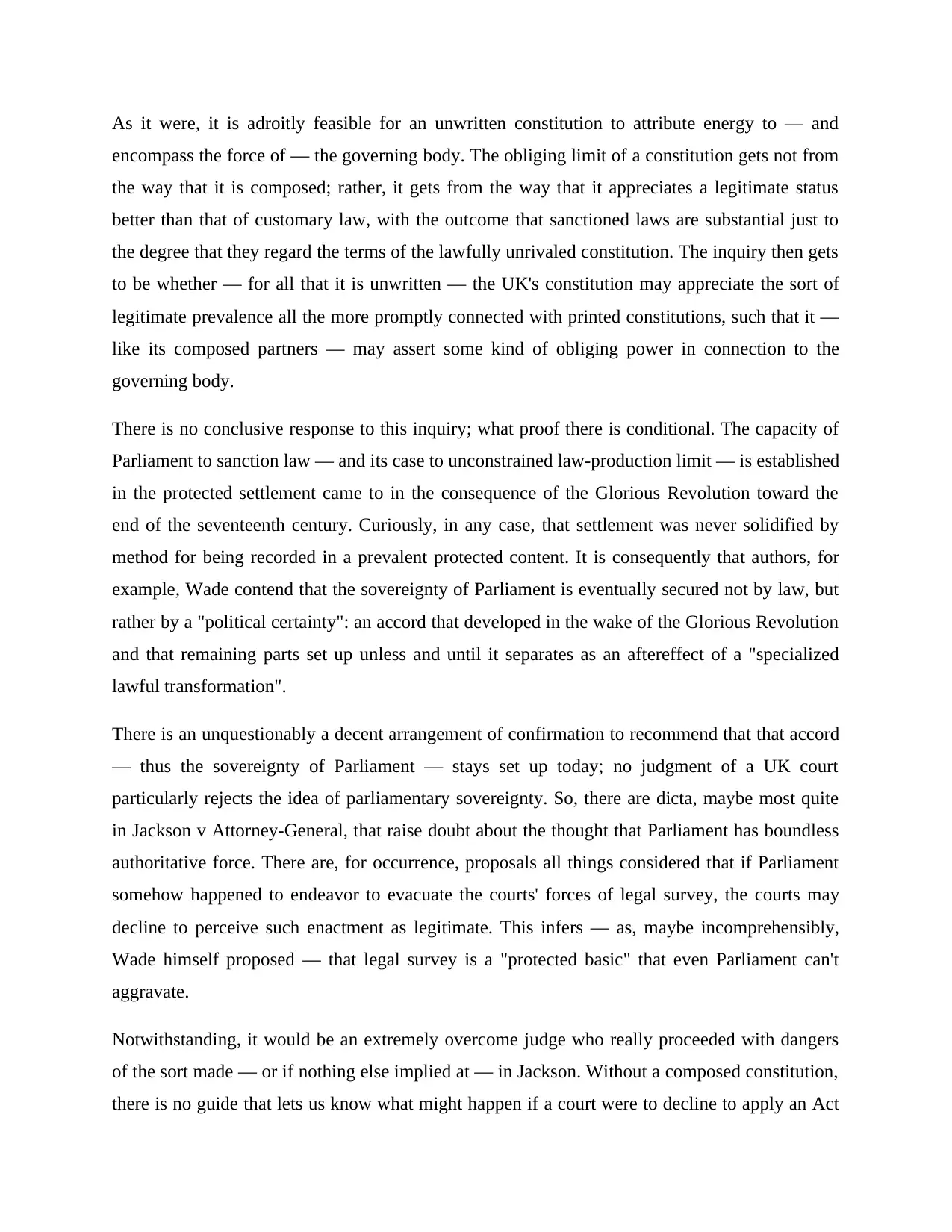
As it were, it is adroitly feasible for an unwritten constitution to attribute energy to — and
encompass the force of — the governing body. The obliging limit of a constitution gets not from
the way that it is composed; rather, it gets from the way that it appreciates a legitimate status
better than that of customary law, with the outcome that sanctioned laws are substantial just to
the degree that they regard the terms of the lawfully unrivaled constitution. The inquiry then gets
to be whether — for all that it is unwritten — the UK's constitution may appreciate the sort of
legitimate prevalence all the more promptly connected with printed constitutions, such that it —
like its composed partners — may assert some kind of obliging power in connection to the
governing body.
There is no conclusive response to this inquiry; what proof there is conditional. The capacity of
Parliament to sanction law — and its case to unconstrained law-production limit — is established
in the protected settlement came to in the consequence of the Glorious Revolution toward the
end of the seventeenth century. Curiously, in any case, that settlement was never solidified by
method for being recorded in a prevalent protected content. It is consequently that authors, for
example, Wade contend that the sovereignty of Parliament is eventually secured not by law, but
rather by a "political certainty": an accord that developed in the wake of the Glorious Revolution
and that remaining parts set up unless and until it separates as an aftereffect of a "specialized
lawful transformation".
There is an unquestionably a decent arrangement of confirmation to recommend that that accord
— thus the sovereignty of Parliament — stays set up today; no judgment of a UK court
particularly rejects the idea of parliamentary sovereignty. So, there are dicta, maybe most quite
in Jackson v Attorney-General, that raise doubt about the thought that Parliament has boundless
authoritative force. There are, for occurrence, proposals all things considered that if Parliament
somehow happened to endeavor to evacuate the courts' forces of legal survey, the courts may
decline to perceive such enactment as legitimate. This infers — as, maybe incomprehensibly,
Wade himself proposed — that legal survey is a "protected basic" that even Parliament can't
aggravate.
Notwithstanding, it would be an extremely overcome judge who really proceeded with dangers
of the sort made — or if nothing else implied at — in Jackson. Without a composed constitution,
there is no guide that lets us know what might happen if a court were to decline to apply an Act
encompass the force of — the governing body. The obliging limit of a constitution gets not from
the way that it is composed; rather, it gets from the way that it appreciates a legitimate status
better than that of customary law, with the outcome that sanctioned laws are substantial just to
the degree that they regard the terms of the lawfully unrivaled constitution. The inquiry then gets
to be whether — for all that it is unwritten — the UK's constitution may appreciate the sort of
legitimate prevalence all the more promptly connected with printed constitutions, such that it —
like its composed partners — may assert some kind of obliging power in connection to the
governing body.
There is no conclusive response to this inquiry; what proof there is conditional. The capacity of
Parliament to sanction law — and its case to unconstrained law-production limit — is established
in the protected settlement came to in the consequence of the Glorious Revolution toward the
end of the seventeenth century. Curiously, in any case, that settlement was never solidified by
method for being recorded in a prevalent protected content. It is consequently that authors, for
example, Wade contend that the sovereignty of Parliament is eventually secured not by law, but
rather by a "political certainty": an accord that developed in the wake of the Glorious Revolution
and that remaining parts set up unless and until it separates as an aftereffect of a "specialized
lawful transformation".
There is an unquestionably a decent arrangement of confirmation to recommend that that accord
— thus the sovereignty of Parliament — stays set up today; no judgment of a UK court
particularly rejects the idea of parliamentary sovereignty. So, there are dicta, maybe most quite
in Jackson v Attorney-General, that raise doubt about the thought that Parliament has boundless
authoritative force. There are, for occurrence, proposals all things considered that if Parliament
somehow happened to endeavor to evacuate the courts' forces of legal survey, the courts may
decline to perceive such enactment as legitimate. This infers — as, maybe incomprehensibly,
Wade himself proposed — that legal survey is a "protected basic" that even Parliament can't
aggravate.
Notwithstanding, it would be an extremely overcome judge who really proceeded with dangers
of the sort made — or if nothing else implied at — in Jackson. Without a composed constitution,
there is no guide that lets us know what might happen if a court were to decline to apply an Act
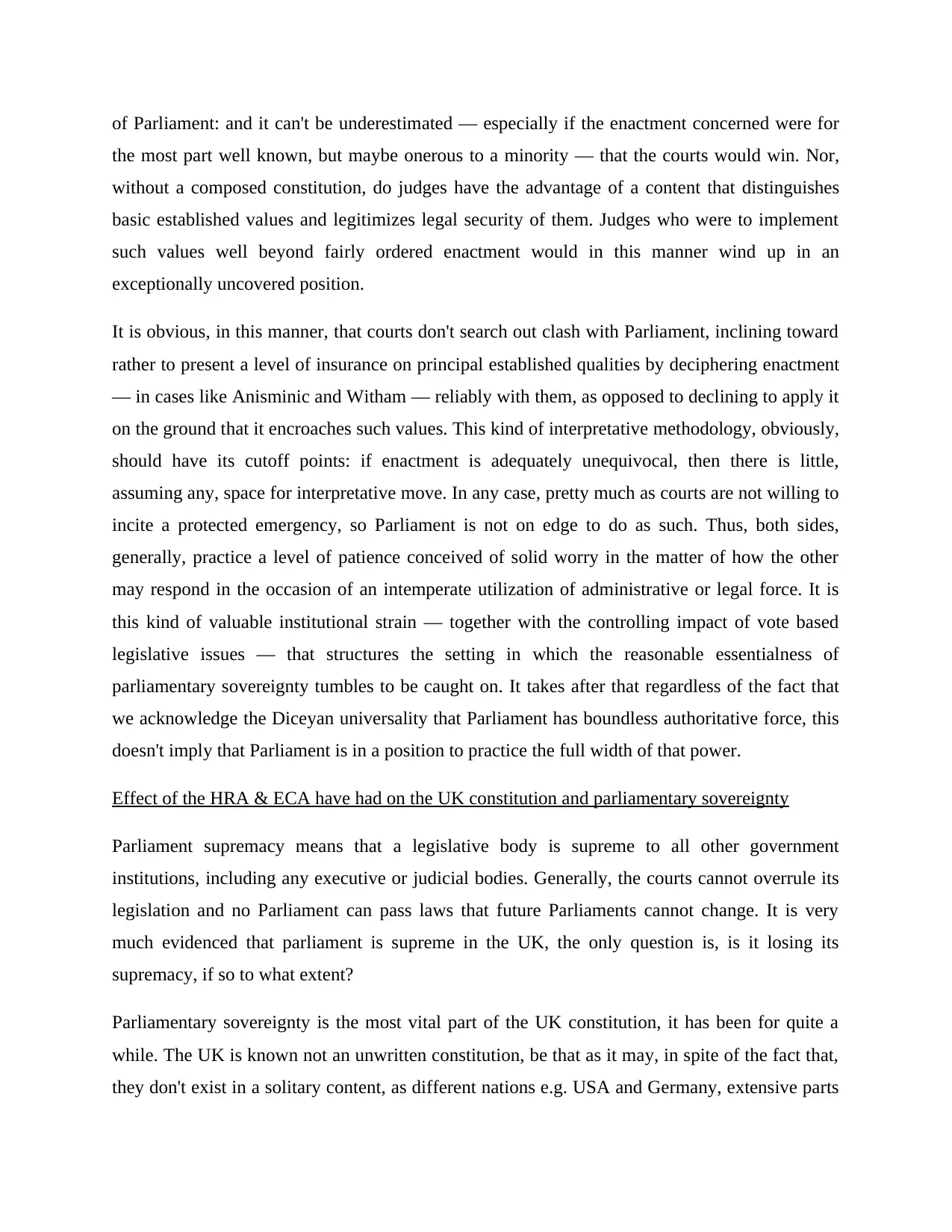
of Parliament: and it can't be underestimated — especially if the enactment concerned were for
the most part well known, but maybe onerous to a minority — that the courts would win. Nor,
without a composed constitution, do judges have the advantage of a content that distinguishes
basic established values and legitimizes legal security of them. Judges who were to implement
such values well beyond fairly ordered enactment would in this manner wind up in an
exceptionally uncovered position.
It is obvious, in this manner, that courts don't search out clash with Parliament, inclining toward
rather to present a level of insurance on principal established qualities by deciphering enactment
— in cases like Anisminic and Witham — reliably with them, as opposed to declining to apply it
on the ground that it encroaches such values. This kind of interpretative methodology, obviously,
should have its cutoff points: if enactment is adequately unequivocal, then there is little,
assuming any, space for interpretative move. In any case, pretty much as courts are not willing to
incite a protected emergency, so Parliament is not on edge to do as such. Thus, both sides,
generally, practice a level of patience conceived of solid worry in the matter of how the other
may respond in the occasion of an intemperate utilization of administrative or legal force. It is
this kind of valuable institutional strain — together with the controlling impact of vote based
legislative issues — that structures the setting in which the reasonable essentialness of
parliamentary sovereignty tumbles to be caught on. It takes after that regardless of the fact that
we acknowledge the Diceyan universality that Parliament has boundless authoritative force, this
doesn't imply that Parliament is in a position to practice the full width of that power.
Effect of the HRA & ECA have had on the UK constitution and parliamentary sovereignty
Parliament supremacy means that a legislative body is supreme to all other government
institutions, including any executive or judicial bodies. Generally, the courts cannot overrule its
legislation and no Parliament can pass laws that future Parliaments cannot change. It is very
much evidenced that parliament is supreme in the UK, the only question is, is it losing its
supremacy, if so to what extent?
Parliamentary sovereignty is the most vital part of the UK constitution, it has been for quite a
while. The UK is known not an unwritten constitution, be that as it may, in spite of the fact that,
they don't exist in a solitary content, as different nations e.g. USA and Germany, extensive parts
the most part well known, but maybe onerous to a minority — that the courts would win. Nor,
without a composed constitution, do judges have the advantage of a content that distinguishes
basic established values and legitimizes legal security of them. Judges who were to implement
such values well beyond fairly ordered enactment would in this manner wind up in an
exceptionally uncovered position.
It is obvious, in this manner, that courts don't search out clash with Parliament, inclining toward
rather to present a level of insurance on principal established qualities by deciphering enactment
— in cases like Anisminic and Witham — reliably with them, as opposed to declining to apply it
on the ground that it encroaches such values. This kind of interpretative methodology, obviously,
should have its cutoff points: if enactment is adequately unequivocal, then there is little,
assuming any, space for interpretative move. In any case, pretty much as courts are not willing to
incite a protected emergency, so Parliament is not on edge to do as such. Thus, both sides,
generally, practice a level of patience conceived of solid worry in the matter of how the other
may respond in the occasion of an intemperate utilization of administrative or legal force. It is
this kind of valuable institutional strain — together with the controlling impact of vote based
legislative issues — that structures the setting in which the reasonable essentialness of
parliamentary sovereignty tumbles to be caught on. It takes after that regardless of the fact that
we acknowledge the Diceyan universality that Parliament has boundless authoritative force, this
doesn't imply that Parliament is in a position to practice the full width of that power.
Effect of the HRA & ECA have had on the UK constitution and parliamentary sovereignty
Parliament supremacy means that a legislative body is supreme to all other government
institutions, including any executive or judicial bodies. Generally, the courts cannot overrule its
legislation and no Parliament can pass laws that future Parliaments cannot change. It is very
much evidenced that parliament is supreme in the UK, the only question is, is it losing its
supremacy, if so to what extent?
Parliamentary sovereignty is the most vital part of the UK constitution, it has been for quite a
while. The UK is known not an unwritten constitution, be that as it may, in spite of the fact that,
they don't exist in a solitary content, as different nations e.g. USA and Germany, extensive parts
⊘ This is a preview!⊘
Do you want full access?
Subscribe today to unlock all pages.

Trusted by 1+ million students worldwide
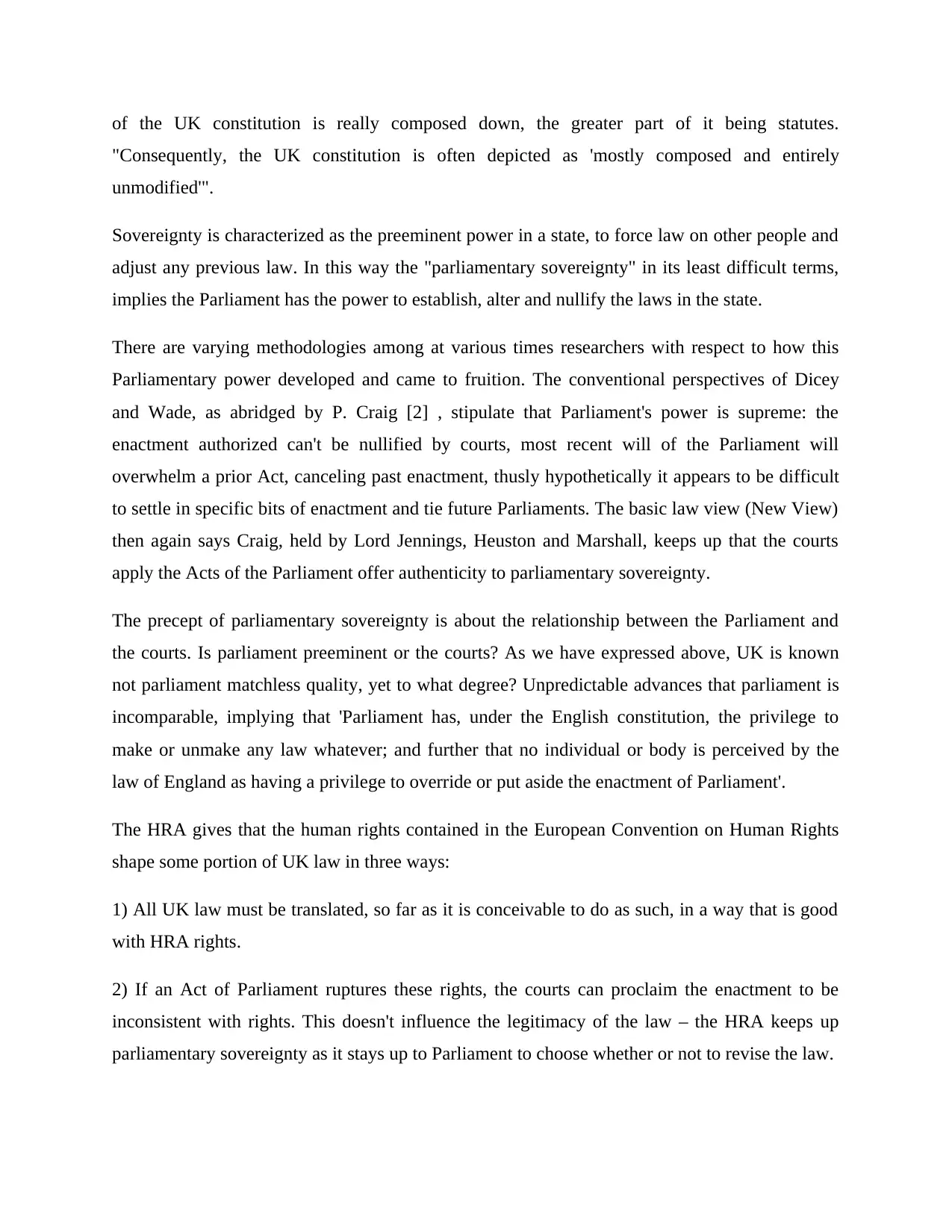
of the UK constitution is really composed down, the greater part of it being statutes.
"Consequently, the UK constitution is often depicted as 'mostly composed and entirely
unmodified'".
Sovereignty is characterized as the preeminent power in a state, to force law on other people and
adjust any previous law. In this way the "parliamentary sovereignty" in its least difficult terms,
implies the Parliament has the power to establish, alter and nullify the laws in the state.
There are varying methodologies among at various times researchers with respect to how this
Parliamentary power developed and came to fruition. The conventional perspectives of Dicey
and Wade, as abridged by P. Craig [2] , stipulate that Parliament's power is supreme: the
enactment authorized can't be nullified by courts, most recent will of the Parliament will
overwhelm a prior Act, canceling past enactment, thusly hypothetically it appears to be difficult
to settle in specific bits of enactment and tie future Parliaments. The basic law view (New View)
then again says Craig, held by Lord Jennings, Heuston and Marshall, keeps up that the courts
apply the Acts of the Parliament offer authenticity to parliamentary sovereignty.
The precept of parliamentary sovereignty is about the relationship between the Parliament and
the courts. Is parliament preeminent or the courts? As we have expressed above, UK is known
not parliament matchless quality, yet to what degree? Unpredictable advances that parliament is
incomparable, implying that 'Parliament has, under the English constitution, the privilege to
make or unmake any law whatever; and further that no individual or body is perceived by the
law of England as having a privilege to override or put aside the enactment of Parliament'.
The HRA gives that the human rights contained in the European Convention on Human Rights
shape some portion of UK law in three ways:
1) All UK law must be translated, so far as it is conceivable to do as such, in a way that is good
with HRA rights.
2) If an Act of Parliament ruptures these rights, the courts can proclaim the enactment to be
inconsistent with rights. This doesn't influence the legitimacy of the law – the HRA keeps up
parliamentary sovereignty as it stays up to Parliament to choose whether or not to revise the law.
"Consequently, the UK constitution is often depicted as 'mostly composed and entirely
unmodified'".
Sovereignty is characterized as the preeminent power in a state, to force law on other people and
adjust any previous law. In this way the "parliamentary sovereignty" in its least difficult terms,
implies the Parliament has the power to establish, alter and nullify the laws in the state.
There are varying methodologies among at various times researchers with respect to how this
Parliamentary power developed and came to fruition. The conventional perspectives of Dicey
and Wade, as abridged by P. Craig [2] , stipulate that Parliament's power is supreme: the
enactment authorized can't be nullified by courts, most recent will of the Parliament will
overwhelm a prior Act, canceling past enactment, thusly hypothetically it appears to be difficult
to settle in specific bits of enactment and tie future Parliaments. The basic law view (New View)
then again says Craig, held by Lord Jennings, Heuston and Marshall, keeps up that the courts
apply the Acts of the Parliament offer authenticity to parliamentary sovereignty.
The precept of parliamentary sovereignty is about the relationship between the Parliament and
the courts. Is parliament preeminent or the courts? As we have expressed above, UK is known
not parliament matchless quality, yet to what degree? Unpredictable advances that parliament is
incomparable, implying that 'Parliament has, under the English constitution, the privilege to
make or unmake any law whatever; and further that no individual or body is perceived by the
law of England as having a privilege to override or put aside the enactment of Parliament'.
The HRA gives that the human rights contained in the European Convention on Human Rights
shape some portion of UK law in three ways:
1) All UK law must be translated, so far as it is conceivable to do as such, in a way that is good
with HRA rights.
2) If an Act of Parliament ruptures these rights, the courts can proclaim the enactment to be
inconsistent with rights. This doesn't influence the legitimacy of the law – the HRA keeps up
parliamentary sovereignty as it stays up to Parliament to choose whether or not to revise the law.
Paraphrase This Document
Need a fresh take? Get an instant paraphrase of this document with our AI Paraphraser
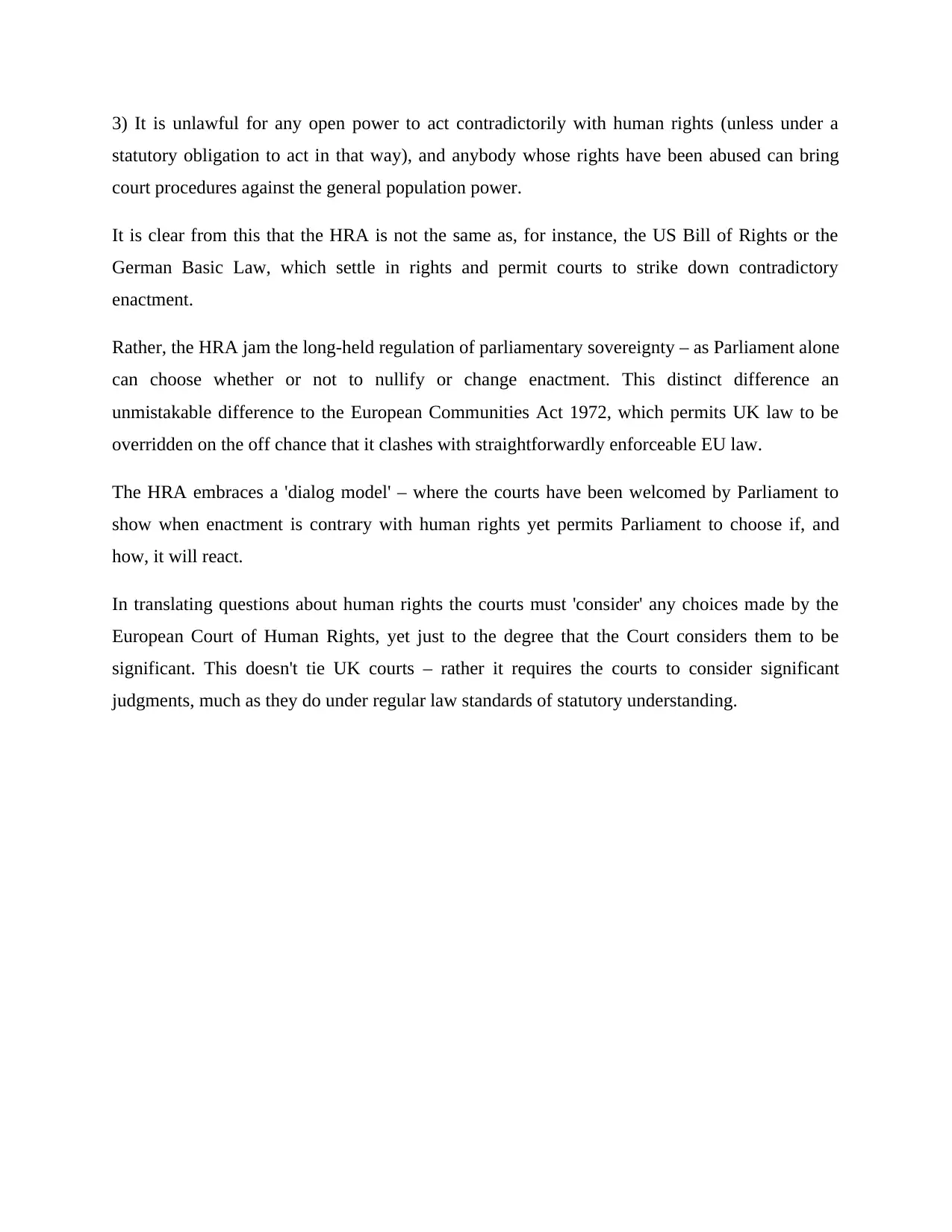
3) It is unlawful for any open power to act contradictorily with human rights (unless under a
statutory obligation to act in that way), and anybody whose rights have been abused can bring
court procedures against the general population power.
It is clear from this that the HRA is not the same as, for instance, the US Bill of Rights or the
German Basic Law, which settle in rights and permit courts to strike down contradictory
enactment.
Rather, the HRA jam the long-held regulation of parliamentary sovereignty – as Parliament alone
can choose whether or not to nullify or change enactment. This distinct difference an
unmistakable difference to the European Communities Act 1972, which permits UK law to be
overridden on the off chance that it clashes with straightforwardly enforceable EU law.
The HRA embraces a 'dialog model' – where the courts have been welcomed by Parliament to
show when enactment is contrary with human rights yet permits Parliament to choose if, and
how, it will react.
In translating questions about human rights the courts must 'consider' any choices made by the
European Court of Human Rights, yet just to the degree that the Court considers them to be
significant. This doesn't tie UK courts – rather it requires the courts to consider significant
judgments, much as they do under regular law standards of statutory understanding.
statutory obligation to act in that way), and anybody whose rights have been abused can bring
court procedures against the general population power.
It is clear from this that the HRA is not the same as, for instance, the US Bill of Rights or the
German Basic Law, which settle in rights and permit courts to strike down contradictory
enactment.
Rather, the HRA jam the long-held regulation of parliamentary sovereignty – as Parliament alone
can choose whether or not to nullify or change enactment. This distinct difference an
unmistakable difference to the European Communities Act 1972, which permits UK law to be
overridden on the off chance that it clashes with straightforwardly enforceable EU law.
The HRA embraces a 'dialog model' – where the courts have been welcomed by Parliament to
show when enactment is contrary with human rights yet permits Parliament to choose if, and
how, it will react.
In translating questions about human rights the courts must 'consider' any choices made by the
European Court of Human Rights, yet just to the degree that the Court considers them to be
significant. This doesn't tie UK courts – rather it requires the courts to consider significant
judgments, much as they do under regular law standards of statutory understanding.
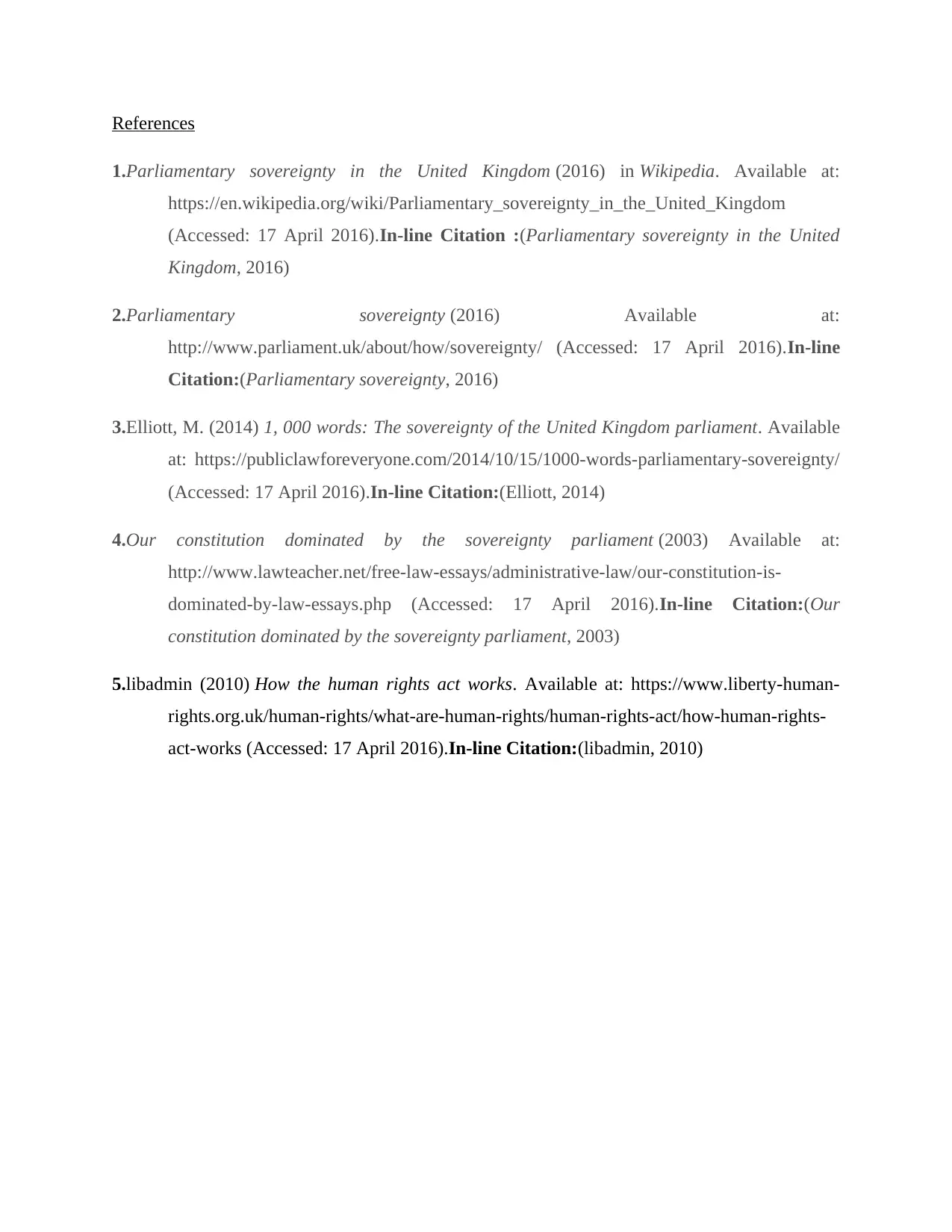
References
1.Parliamentary sovereignty in the United Kingdom (2016) in Wikipedia. Available at:
https://en.wikipedia.org/wiki/Parliamentary_sovereignty_in_the_United_Kingdom
(Accessed: 17 April 2016).In-line Citation :(Parliamentary sovereignty in the United
Kingdom, 2016)
2.Parliamentary sovereignty (2016) Available at:
http://www.parliament.uk/about/how/sovereignty/ (Accessed: 17 April 2016).In-line
Citation:(Parliamentary sovereignty, 2016)
3.Elliott, M. (2014) 1, 000 words: The sovereignty of the United Kingdom parliament. Available
at: https://publiclawforeveryone.com/2014/10/15/1000-words-parliamentary-sovereignty/
(Accessed: 17 April 2016).In-line Citation:(Elliott, 2014)
4.Our constitution dominated by the sovereignty parliament (2003) Available at:
http://www.lawteacher.net/free-law-essays/administrative-law/our-constitution-is-
dominated-by-law-essays.php (Accessed: 17 April 2016).In-line Citation:(Our
constitution dominated by the sovereignty parliament, 2003)
5.libadmin (2010) How the human rights act works. Available at: https://www.liberty-human-
rights.org.uk/human-rights/what-are-human-rights/human-rights-act/how-human-rights-
act-works (Accessed: 17 April 2016).In-line Citation:(libadmin, 2010)
1.Parliamentary sovereignty in the United Kingdom (2016) in Wikipedia. Available at:
https://en.wikipedia.org/wiki/Parliamentary_sovereignty_in_the_United_Kingdom
(Accessed: 17 April 2016).In-line Citation :(Parliamentary sovereignty in the United
Kingdom, 2016)
2.Parliamentary sovereignty (2016) Available at:
http://www.parliament.uk/about/how/sovereignty/ (Accessed: 17 April 2016).In-line
Citation:(Parliamentary sovereignty, 2016)
3.Elliott, M. (2014) 1, 000 words: The sovereignty of the United Kingdom parliament. Available
at: https://publiclawforeveryone.com/2014/10/15/1000-words-parliamentary-sovereignty/
(Accessed: 17 April 2016).In-line Citation:(Elliott, 2014)
4.Our constitution dominated by the sovereignty parliament (2003) Available at:
http://www.lawteacher.net/free-law-essays/administrative-law/our-constitution-is-
dominated-by-law-essays.php (Accessed: 17 April 2016).In-line Citation:(Our
constitution dominated by the sovereignty parliament, 2003)
5.libadmin (2010) How the human rights act works. Available at: https://www.liberty-human-
rights.org.uk/human-rights/what-are-human-rights/human-rights-act/how-human-rights-
act-works (Accessed: 17 April 2016).In-line Citation:(libadmin, 2010)
⊘ This is a preview!⊘
Do you want full access?
Subscribe today to unlock all pages.

Trusted by 1+ million students worldwide
1 out of 9
Related Documents
Your All-in-One AI-Powered Toolkit for Academic Success.
+13062052269
info@desklib.com
Available 24*7 on WhatsApp / Email
![[object Object]](/_next/static/media/star-bottom.7253800d.svg)
Unlock your academic potential
Copyright © 2020–2026 A2Z Services. All Rights Reserved. Developed and managed by ZUCOL.


![Business Law: Exploring the UK Constitution - [University Name] Essay](/_next/image/?url=https%3A%2F%2Fdesklib.com%2Fmedia%2Fuk-constitution-written-unwritten_page_2.jpg&w=256&q=75)


